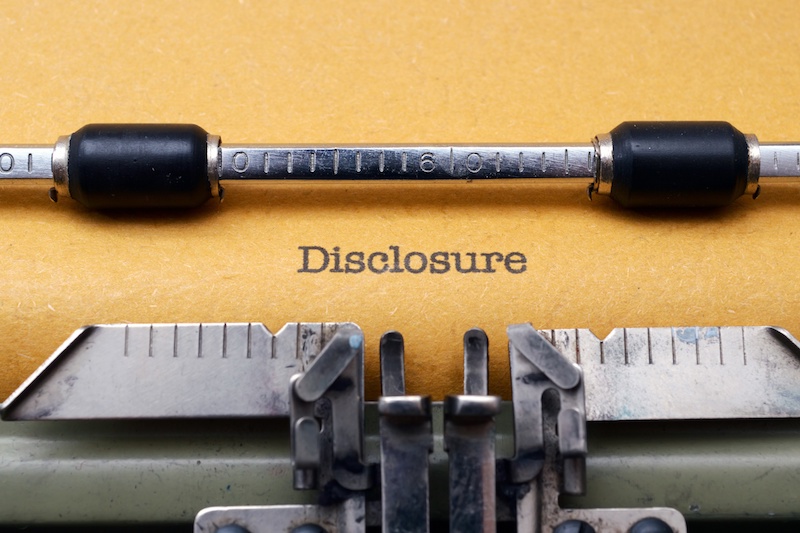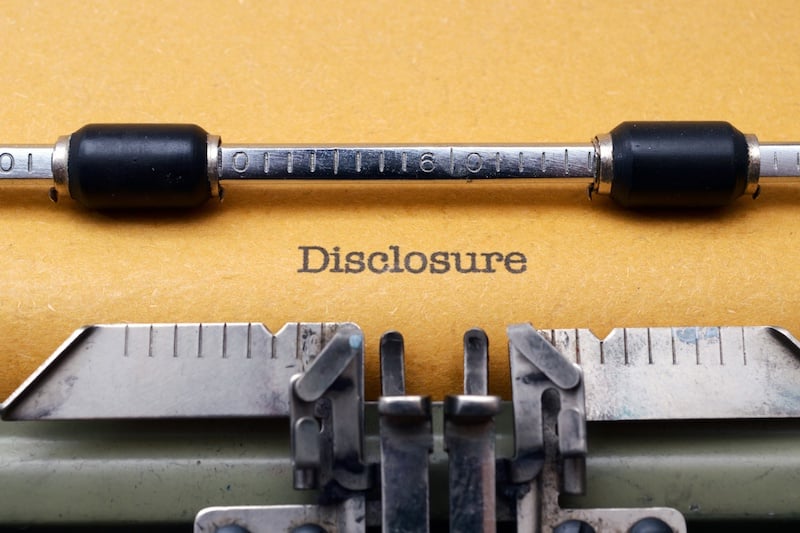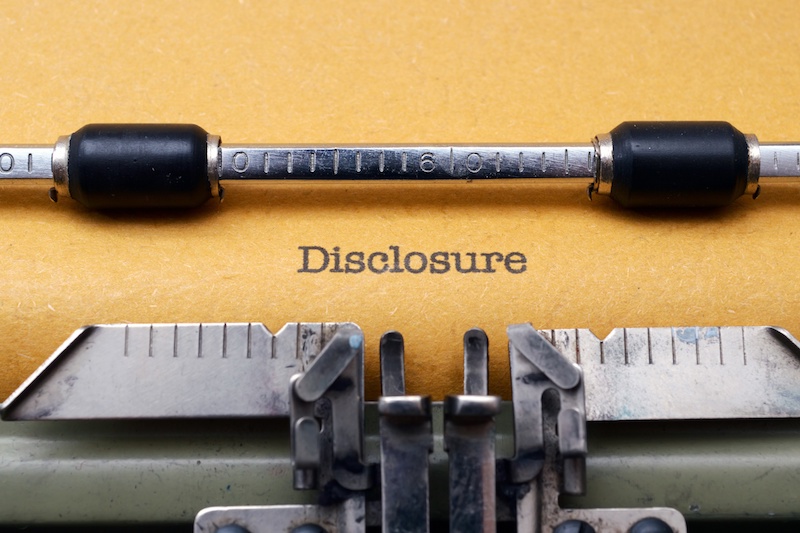It’s time to sell your home in Virginia, and you realize you need to do something known as “disclosure.” So what is it? Disclosure laws dictate what a home seller must tell a home buyer about the defects/current state of their property when they go to sell.
Virginia’s disclosure requirements are fairly minimal when compared to the disclosures required by other states. You might be wondering: do I need to disclose work that’s been done on the house? What about mold?
Here’s what you need to know.
Virginia Follows a Rule of “Caveat Emptor”
Virginia is one of the oldest states in the U.S., and its disclosure laws still follow an old English common-law concept known as “caveat emptor” - buyer beware. In most states, sellers are required to inform the buyer of known defects of the house and must fill out a fairly long document that indicates many possible issues (such as a leaky roof, or a land dispute. Read up on what Pennsylvania’s property disclosure looks like, for comparison). In Virginia, by contrast, the disclosure form is short and simple.
“Our disclosure is just a one-pager and it simply states that the owners don’t know of any ongoing issues with the home,” explains Virginia-based listing agent Angela Allison.
So long as no lying or fraud occurs (example: your roof leaks in the winter. The buyer asks you about the roof’s condition, and you lie and say you’ve never had an issue with it), any problems with the home are considered the buyer’s problems to deal with once the deal has been closed. The seller is not required to list the issues. You can think of this as a home is sold “as is” type of agreement where the burden is on the buyer to uncover the defects.
Some exceptions to this are national disclosure requirements, like the lead based paint disclosure - no state or property can opt out of this. If you sell a home built prior to 1978, for example, you will need to obtain a lead-based paint inspection.
Should I Disclose My Home's Problem in VA?
As a seller, it’s in your best interest to disclose what you know, even if the state doesn’t require you to list every issue out.
Why?
- By disclosing all the issues, buyers have more confidence in what they’re buying.
- It reduces the likelihood of the buyer backing out due to issues that come up during the home inspection, which can throw off your moving timeline.
- Disclosure reduces liability for the seller, which is extremely important for a huge transaction like a home. Real estate lawsuits are common - and they can be costly to resolve.
“If there’s any issue at all that’s ongoing/that hasn’t been resolved, it is the sole responsibility of the seller to disclose that to us as the agent,” explains Allison.
“For every listing, I say to the seller: you’re going to get a listing package, and it’s going to have a DPOR (Department of Professional and Occupational Regulation) residential property disclosure,” continues Allison. “And if there are any ongoing issues, it's your responsibility to let me know right now. If the buyers find out that there’s an issue - and your homeowner’s insurance is going to show that [the issue] - you’re setting yourself up for a lawsuit.”
If you’re not sure whether you should disclose something, always consult with your agent. They will be your best resource when it comes to selling your home and ensuring that you are doing what you should to get top offers, without opening yourself up to future liability.
Virginia: What the Buyer Receives
In Virginia, if you are a home buyer, your agent will give you a disclosure document spelling out what the seller is not liable for, for informational purposes and to confirm that you understand your rights and obligations under The Virginia Residential Property Disclosure Act.
If it’s been a few years since you last bought or sold a home in Virginia, pay attention to the current buyer's disclosure document, as six new disclosures were added in 2020, while one was removed: “Disclosures regarding stormwater detention faculties were removed from the Statement and are now mandatory, affirmative disclosure obligations of the seller,” according to NVAR.
So what exactly is listed in the Virginia Disclosure Statement that buyers need to understand? Here’s what you need to know.
- Condition: the first section of the disclosure statement explains that the disclosure is not equivalent to a warranty. In other words, if something stops working once the property transfers from seller to buyer, it’s the buyer’s responsibility to deal with it - not the seller. Buyers are also advised in this section to do their due diligence when making a home sale, which includes getting a home inspection.
- Adjacent parcels: this section indicates that the owners are not advising the seller as to adjacent land parcels, whether that’s concerning zoning or permitted uses.
- Historic District Ordinance(s): The owners are not advising the seller as to whether the home is in a historic district. This can be important in Virginia because many homes are older and may fall into historic jurisdiction - in which case, a local review board may need to sign off on any work done to a property. Typically, historic districts limit the changes that can be done to the exterior of a historic building, among other things. It’s the seller’s responsibility to find and review any documents relating to this.
- Resource Protected Areas: The Chesapeake Bay Preservation Act was enacted in 1988 as a pollution management program. Homes located in the preservation areas have to uphold various requirements to help preserve water quality, such as minimizing land disturbances and following tree canopy coverage minimums.
- Sexual Offenders: it’s the seller’s responsibility to see if anyone on the local sex offender registry is located nearby. The owner is making no claim as to whether offenders are or aren’t located nearby.
- Dam Break Inundation Zones: if a dam were to fail, the area downstream that would be flooded is known as the “dam break inundation zone.” Virginia has a wet climate and hence is home to about 150 dams. If buyers are concerned about living downstream from a dam, it’s their responsibility to do due diligence and see if they’re located in an area that would flood if the dam broke.
- Wastewater System: It’s the seller’s responsibility to uncover what the wastewater system is on the property (if any) as well as what the associated costs are (does the septic tank need to be pumped out, for example?).
- Solar Energy Collection Devices: If the seller is interested in installing or using solar energy collection devices, it’s their own responsibility to find out whether it’s allowed on the property.
- Special Flood Hazard Areas: It’s the buyer’s prerogative to determine whether the property is located in a special flood hazard area, and finding out whether flood insurance is required.
- Conservation or Other Easements: it’s up to the buyer to determine whether the land is subject to conservation or other easements (an easement is when an organization or group has permission to use the land).
- Community Development Authority: the buyer needs to do due diligence to determine whether the property is subject to a community development authority, which is fairly common in Virginia.
- Marine Clays: the sellers make no claim as to whether the home is located on or near marine clays, which are known for causing settlement and foundation issues. This type of soil has a high moisture content that can cause it to shrink and swell throughout the year
- Radon Gas: the owner makes no representations as to whether the property is located in a Radon Zone, as determined by the U.S. Environmental Protection Agency (EPA). Radon is a radioactive gas released naturally by soil, rock, and water that can increase the risk of developing lung cancer.
- Defective Drywall: defective drywall refers to tainted drywall that was brought to the U.S. from China between 2001 and 2007. This drywall is known to emit sulfur gasses, which poses both a health and home safety hazard. The owner makes no claims as to whether the property does or doesn’t have defective drywall.
- Lead Pipes: older homes are sometimes constructed with lead pipes. Water running through these pipes can absorb the lead, which is harmful to ingest (and is especially harmful to children). The sellers make no guarantee as to whether or not the home’s pipes meet the federal Safe Drinking Water Act’s definition of “lead free.”
- Impounding Structures or Dams: the owner is not obligated to inform the buyer of a dam on the property, and it’s the buyer’s responsibility to investigate whether such a dam exists and what its maintenance costs/requirements are, etc.
Further Reading



